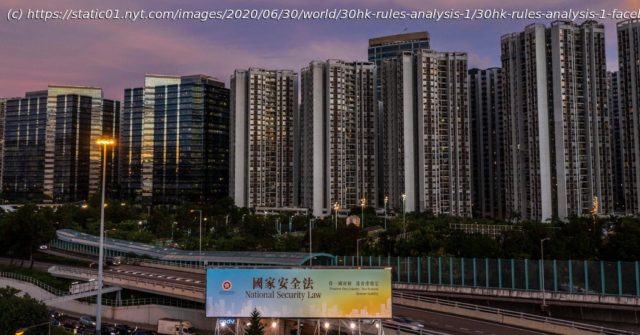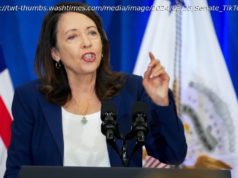In passing the rules, China’s leaders faced down the democracy movement in Hong Kong and shrugged off opposition from the Trump administration.
A year after protesters in Hong Kong jubilantly defied Chinese rule, the national leader, Xi Jinping, has opened a long-term counteroffensive in the territory, signing a new security law on Tuesday that sets obedience to Beijing above the former British colony’s civil freedoms.
Conceived in secrecy and passed with intimidating speed, the law has ignited uncertainty about the future of Hong Kong even before any arrests under its sweeping new powers to quash political activity and speech that challenges Beijing. Chinese officials and policy advisers have described the security law as part of a “second return” for Hong Kong, one, they suggest, that will scrub away a dangerous residue of Western influence and liberal values.
By introducing such far-reaching legislation, Communist Party leaders in Beijing have faced down the pro-democracy movement in Hong Kong. They have also shrugged off opposition from the Trump administration and other governments, showing Mr. Xi’s determination to remake the territory on his authoritarian terms.
Some critics have described the law as a potentially fatal blow to the“One Country, Two Systems” political framework that preserved Hong Kong’s distinctive status, freedoms and laws after China resumed sovereignty in 1997. Even before taking effect, the law has already created a chill among once-defiant activists who defined the protest movement.
“Hong Kong people understand this means the end of the ‘One Country, Two Systems’ model for the territory, and we are now reduced to being a city like on the mainland, like Shenzhen or Shanghai,” said Joseph Cheng, a longtime political scientist at City University of Hong Kong. “We will have to behave like the people on the mainland.”
At the least, the new law complicates the delicate, often-convoluted game that Hong Kong officials and judges have played since China took back the territory. They have long tried to satisfy Beijing’s demands for loyalty while seeking to assure Hong Kong people that the territory’s legal system remained basically insulated from politics, guarding rights absent in mainland China.
That straddling act has become increasingly unsteady in recent years as China has applied growing pressure on the territory while protesters in Hong Kong have pressed back, demanding free elections and greater autonomy.
Now the security law — creating a murky realm of police agencies, crimes defined by Beijing and judges picked by Hong Kong’s pro-Beijing leader — is likely to make it harder to preserve the city’s nebulous status as a semiautonomous enclave under a Communist Party-run superpower.
“This will change Hong Kong. It’s a bridgehead,” said Danny Gittings, an expert on Hong Kong’s legal status. “It’s the most fundamental change since the handover. But that doesn’t mean that the changes will be immediately apparent.”
So far, many companies in Hong Kong appear confident that commerce and contracts will remain largely untouched by the law. Hong Kong officials have said that only a small number of people would be targeted by the rules, and the territory is likely to preserve some room for criticism of the Communist Party of the kind forbidden inside mainland China.






